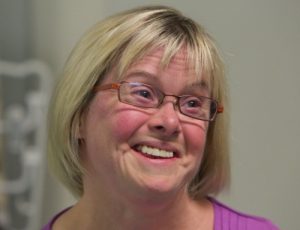
By Susan Gately - 22 June, 2017

Karen Gaffney
“I believe that Down Syndrome is a life worth saying ‘yes’ to. It is a life worth saving. Every life has value, every life matters, regardless of how many chromosomes you have,” says Karen Gaffney, the Ted Talk star, Down Syndrome champion and record swimmer who will address the All Ireland Rally for Life on Saturday 1 July.
Ms Gaffney has captured global attention, not only for her personal achievements in swimming, but for her championing of people with disabilities, in particular through the Karen Gaffney Foundation, which works for “the journey to full inclusion for people with Down Syndrome and other disabilities”.
In 2013 she became the first living person with Down syndrome to receive an honorary doctorate when she was awarded the Doctor of Humane Letters degree from the University of Portland for her work in raising awareness of the abilities of people who have Down Syndrome.
“Imagine that here we are reversing the damage caused by institutions, removing barriers to education, making inroads into a full and inclusive life for people like me, and still we have those who say we shouldn’t even be born at all,” Ms Gaffney told an audience at a Ted Talk in Portland in May 2015.
She said that people with Down Syndrome were now achieving success as musicians and artists, golfers, models, public speakers and good employees making a contribution to society, but that the race was on to find newer, faster ways to diagnose the condition before birth, and that pregnancies that tested positive for Down Syndrome were all too often terminated.
But “every life has value, every life matters, regardless of how many chromosomes you have,” she said.
On 1 July, Ms Gaffney will share that message with tens of thousands of people at the Save the 8th Rally for Life in Dublin city centre.
In Britain 90 per cent of babies with Down Syndrome are being aborted, and in Iceland the rate is 100 per cent. Recent polls show that Irish people are concerned about what legalising abortion means for people with disabilities.
The latest Ipsos/MRBI opinion poll on abortion for the Irish Times (26 May 2017) showed that support for abortion on disability grounds had fallen significantly – down to 36 per cent in the newspaper’s poll, in contrast to support of 61 per cent registered in a Newstalk/Red C poll in January 2016.
Niamh Uí Bhriain of the Rally for Life Committee said the shift in public opinion was due to the fact that people with disabilities and their families had made their voices heard in the public square.
“The stark truth is that abortion is facilitating the most lethal form of discrimination for people with disabilities, and their voices must be heard in this debate. The Eighth Amendment protects the lives of all children – with any disability or none – and this rally gives a platform to those who are urging people to consider that every life has value,” she said.
The Save the 8th Rally begins at 2 pm at Parnell Square, Dublin on 1 July. Organisers are expecting a large crowd.
“There’s a huge buzz building about the rally, we’re inundated with calls and queries and are expecting a massive crowd,” said Ms Uí Bhriain. “People are welcoming an opportunity to come out and show their support for the right to life of both mother and baby, and to show the nation that the pro-life majority is on the move.”

All Ireland Rally for Life
Karen Gaffney was the first person with Down Syndrome to complete a relay swim of the English Channel. Her 2007 swim across the nine-mile span of Lake Tahoe (on the California/Nevada border) became the subject of the documentary Crossing Tahoe: A Swimmer’s Dream. She has also swum across Boston Harbour and completed 16 swims across San Francisco Bay, including the Escape from Alcatraz Triathlon.
Meanwhile, annual statistics for 2016 from the UK’s Department of Health have revealed that 43 Irish babies were aborted in Britain in 2016 because they were diagnosed with Down Syndrome.
Overall, 141 women from the Republic had abortions in the UK on grounds that the babies were at risk of serious disability.
These included seven abortions after a diagnosis of spina bifida. Other abortions included 20 babies from Ireland diagnosed with Edward’s Syndrome and 13 with anencephaly.
For women resident in England and Wales, 3,208 abortions were approved because the baby had a medical condition. In 46 per cent of these cases it was a congenital malformation and in 706 cases the baby was found to have Down Syndrome.